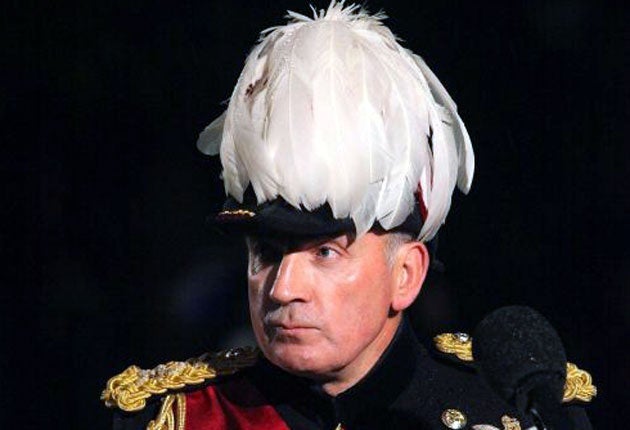Army chiefs turn guns on 'political' Dannatt

The fallout from the Conservatives' recruitment of General Sir Richard Dannatt, the former head of the Army, gathered pace yesterday, when senior military officers criticised the appointment.
The news that the general is to become a Tory peer was meant to be a coup for the party, but instead it has had to defend the move amid disquiet from its own MPs and military commanders.
There are serious concerns in the military that the prospect of General Dannatt becoming a minister in a future Conservative government risks politicising the Army at a time when a bipartisan and united approach on Afghanistan is needed.
There was also worry in the Ministry of Defence about the effect that General Dannatt joining a future government would have on the working relationship of serving commanders with ministers – especially that of the Chief of the Defence Staff, Air Chief Marshal Sir Jock Stirrup.
Other critics pointed out that General Dannatt continues to be on the Army payroll and had accepted the post of the Constable of the Tower of London, a Crown appointment which is meant to be non-political.
The shadow Foreign Secretary, William Hague, denied yesterday that Sir Richard, who will have to be given a peerage to enable him to work as a minister, was a "Tory stooge".
Mr Hague insisted that the country would benefit from the former head of the Army continuing to offer advice on the war. Liam Fox, the shadow Defence Secretary, said: "It's not a crime to bring weight and experience into government with you, and I very much welcome Richard Dannatt as a member advising my team."
However, General Lord Guthrie, a former Chief of the Defence Staff, said that General Dannatt should not take the Tory whip. "If he is going to the House of Lords, it's best to be a crossbencher," Lord Guthrie said. "I will give advice to anyone, Labour or Conservative, but I wouldn't want to be associated with any one political party." Another distinguished former senior commander told The Independent that General Dannatt's action puts his successor, General Sir David Richards, in an "extremely difficult position".
He said: "On a broader basis, this is not good for the Army. It would now be easy to paint the criticisms he made about Afghanistan as political, and that is not fair on others who have also tried to get better resources for our forces."
Ministers are furious about the appointment, having been given assurances by General Dannatt in the summer that he was not acting for party-political reasons. Phil Woolas, the Immigration minister, called the move a "stunt by the Conservative Party".
Other Labour figures were outraged by the move, believing that it "broke the rules" of military independence. While Lord West, the former head of the Navy, joined Gordon Brown's government to become a Home Office minister, he did so after a year's break from the military. General Dannatt's move has come to light in the same week that he criticised Labour's policy in Afghanistan. Lord Foulkes, the Labour peer, said that General Dannatt had worked "hand in glove" with the Tories.
Several Tory MPs say that Sir Richard's attacks on the Government's conduct of the Afghanistan war had been devalued now that he had openly allied himself with the opposition party so soon after leaving his post.
Senior party officials conceded that the way in which the news had leaked was not ideal, but said: "He is a great person to have on board. The fact it came out a day early won't matter at all in the long run."
Mr Hague hinted that a Conservative government could set out a timetable for the withdrawal of UK forces from Afghanistan, as well as making a fresh try to convince sceptical voters over the justification for war.
Mr Hague also said that whenever troops went into combat it would be on the "basis of agreed objectives", the right equipment, co-ordination with development aid and an "explanation from the highest levels of government at the very outset". He said a Conservative government would set up a National Security Council to integrate the roles of the foreign, defence, energy, home and international development departments.
Media campaign: General strikes out
General Sir Richard Dannatt set out his stalls within weeks of being appointed the head of the Army, with a newspaper interview critical of the Government. With the exception of periodic bouts of enforced silence, he has continued in the same vein.
His campaign to improve the welfare of members of the British forces was effective but the way he went about it exasperated ministers and, his critics say, had a detrimental effect on the Army in the competition with other services for dwindling resources. One senior officer – not a friend – observed wryly: "Dannatt got the publicity, but it was the Navy which got the aircraft carriers."
There was rising concern among the military hierarchy that Sir Richard's attacks on the Government were becoming too political. His decision to join the Tories so soon after leaving his post as the head of the Army would add to that argument.
It is also no great secret in the defence field that Sir Richard does not see eye-to-eye with one of the most senior of the serving officers. Meetings on defence matters in any future Cameron government promise to be interesting affairs.
Subscribe to Independent Premium to bookmark this article
Want to bookmark your favourite articles and stories to read or reference later? Start your Independent Premium subscription today.

Join our commenting forum
Join thought-provoking conversations, follow other Independent readers and see their replies